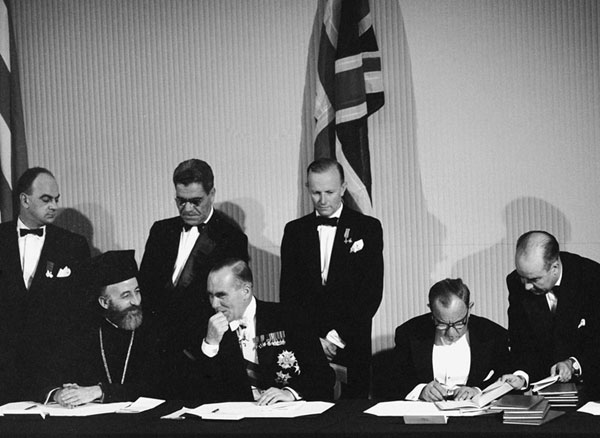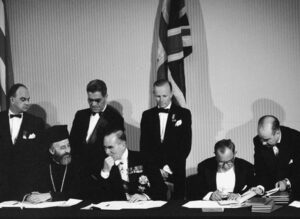
“AKEL and the Zurich – London agreements” by Yiannakis Colocasides, member of the C.C. of AKEL
Sunday, 6th February 2016, “Haravgi” newspaper
90th anniversary Communist Party of Cyprus -AKEL
 On February 11th, 1959 the Prime Ministers of Greece, Constantinos Karamanlis and Turkey Adnan Menderes drew up and concluded, behind the backs of the people of Cyprus, the agreement for the shackled independence of Cyprus. Eight days later, on February 19th at Lancaster House in London, the agreement is ratified with the signature of Greece, Turkey and Britain. The agreement was also ratified by Makarios on behalf of the Greek Cypriot community and Fazil Kucuk on behalf of the Turkish Cypriot community.
On February 11th, 1959 the Prime Ministers of Greece, Constantinos Karamanlis and Turkey Adnan Menderes drew up and concluded, behind the backs of the people of Cyprus, the agreement for the shackled independence of Cyprus. Eight days later, on February 19th at Lancaster House in London, the agreement is ratified with the signature of Greece, Turkey and Britain. The agreement was also ratified by Makarios on behalf of the Greek Cypriot community and Fazil Kucuk on behalf of the Turkish Cypriot community.
The result of deadlock
The Zurich-London agreements was the result of the deadlock in which the anti-colonial struggle of the Cypriot people had been driven to due to the wrong choice of waging an armed struggle adopted by EOKA[1]; a deadlock which was exploited by NATO imperialism to impose its own solution to the Cyprus problem. The deadlock was being expressed through the armed confrontation of Greek Cypriots and Turkish Cypriots and with the threat on the part of Britain to impose the notorious Macmillan plan, which provided for the subordination of Cyprus under the triple sovereignty of England, Turkey and Greece and the continuous threats issued by Turkey which was urgently demanding the partition of Cyprus. Greece after the end of the Civil War, weak and unable to react and defend both the Cypriot people, as well as its own national interests, became the vehicle for the imposition of the agreements was imposing as “a pressing need”.
AKEL from 1955 had warned that the armed struggle “could only cause damage to the cause of the Cypriot struggle”. (Statement of the Political Bureau of AKEL, 01/04/1955).
Grivas[2] himself had admitted the deadlock of the struggle in a letter addressed to the Greek Foreign Minister Averof dated 29/8/1958, in which he wrote: “… the militant struggle whose purpose was to assist the diplomatic struggle, is today at an impasse … ” (“Grivas Memoirs” p. 285).
AKEL’s proposal
Makarios realizing the negative content of the Zurich agreement and perhaps seeking to share the historical burden of the signing of the agreement invited a large group of Greek Cypriot political and social forces to London in order to advise him. For the first time in the history of Cyprus the Left was also invited. It must be recalled that since the death of Leontios[3] and onwards, the unwavering position of the Ethnarchy[4] was to refuse any discussion and any cooperation with the Left. Given that AKEL was still outlawed and underground, the Mayors of Limassol Costas Partasides, Famagusta and Larnaca Mayors Andreas Pougiouros Georgos Christodoulides respectively, the General Secretary of the Pancyprian Federation of Labour (PEO) Andreas Ziartides and the Editor of the newspaper “Haravgi” Stelios Iakovides were called upon to participate on behalf of the Left. By a decision of the Party, the General Secretary of AKEL Ezekias Papaioannou and Andreas Fantis also went to London without being members of the official delegation.
AKEL had no official briefing on what was agreed. It only gained information through press reports about what was going on. Therefore, the Political Bureau of AKEL, which convened before the departure of the mission to London, instructed the Party representatives to seek “amendments to those provisions of the agreement that would be considered unacceptable” (Action Report towards the 9th Congress of AKEL). The real situation of the content of the agreements came to the attention of AKEL there in London. Georgos Christodoulides in reference to the evolving situation in London notes that: “The meetings of the representatives in London were chaired by Bishop Anthimos of Kition who was acting as Makarios’ replacement as a result of his enforced exile. He had in his possession the only copy of the Agreement. He read the text and refused to allow any another person to see the points under discussion. He tried to give his own interpretations, even on explicitly legal points of the Agreement. When we saw the document we began to realize the serious situation that we had before us.” (From the minutes of a Symposium dedicated to the anti-colonial struggle organized by AKEL in 1995).
The Right-wing representatives, with very few exceptions, despite their initial opposition, were eventually “persuaded” to advise Makarios to accept the Zurich agreement. The representatives of AKEL now knowing the real content of the Zurich agreement decided to advise Makarios to reject it. Indeed, Papaioannou and Fantis met with Makarios where they handed a Memo containing the position of AKEL. Of course, AKEL knew that a simple “No” would not solve the problem.
The situation in Cyprus was explosive, the bloodshed could have escalated and the dangers were immediate. This is the reason why AKEL advised Makarios that in the event he would reject the Zurich agreement he should declare a) that the armed struggle of EOKA should be terminated and b) that the Cypriot people, united, should continue the mass-political struggle in order to attain real independence. AKEL’s proposal was realistic and well thought out. The ending of the armed struggle would deescalate the volatile situation in Cyprus, would put an end to inter-communal clashes and remove any pretext for the British colonialists and Turkey to impose either the Macmillan plan or any other partitionist plan. Without the blackmails looming over Cyprus like a sword of Damocles the struggle of the Cypriot people could continue with its forces united to achieve real independence.
Why was AKEL’s proposal not accepted?
Makarios eventually endorsed the Agreements. Whole volumes have been written about the pressure exerted by the Greek government, the Greek Queen Frederica and the blackmails on him in general to accept the agreements. We do not disregard these factors. However, an additional factor must also be taken into account. Any acceptance of AKEL’s proposal would in reality mean an admission of the fatal mistake to wage an armed struggle. And none of the leaders of the Right had the strength to make such an admission.
Long before the Zurich agreement was drawn up and concluded, Grivas in a letter addressed to Makarios dated 27th April 1957 about the possible termination of the struggle of EOKA wrote the following: “Both AKEL and International Communism will exploit the cessation of the Struggle… If there is an end to our struggle, then they (that is to say, the communists) will appear on the scene and proclaim the correctness of their own tactics” (“Grivas Memoirs” p. 171). This is very revealing. Cyprus was led to disaster, just so that AKEL would not be vindicated.
The General Secretary of AKEL Ezekias Papaioannou in his book “Recollections” raises another very interesting aspect concerning the developments. Papaioannou once asked Makarios if the reason he signed the agreements were because of the pressures exerted by the Greek Prime Minister Karamanlis. Makarios replied: “Those who were putting pressure on me to sign were certain EOKA captains who came to Athens after my release from exile in the Seychelles and were begging me to sign to end their suffering. They could no longer stand it and if I didn’t sign they would collapse entirely. This is the real reason that forced me to sign the agreements and no one else.” (Papaioannou “Recollections” p. 116).
Responsible position
AKEL, when the Zurich-London agreements had by then been signed, made an in-depth comprehensive analysis of the situation. The decision of the Political Bureau of the Party on the new situation that had been formed was published on March 7th, 1959 as a statement of E. Papaioannou, given that AKEL was still illegal and underground. In that decision AKEL’s opposition was again stressed to agreements for the following reasons: a shackled limited independence was granted, the British presence was perpetuated through the establishment of British bases, the Agreements made the UK, Greece and Turkey guarantor powers with rights of intervention, the agreements brought Turkish and Greek troops to Cyprus and a given and undemocratic constitution was imposed that that brought into conflict Greek Cypriots and Turkish Cypriots.
However, AKEL does not remain on its rejection alone. Retaining its disagreement, it also proceeds and elaborates its position on what must be done: “The Zurich-London agreement, no matter how many disagreements or concerns our people may have about it, about the negatives it contains, already constitutes a given fact and a reality. This agreement closes one chapter of Cyprus history and opens a new page; the page of the new Republic of Cyprus. We are therefore obliged to face with realism and pragmatism the new reality…
Under the new regime imposed by the Zurich-London agreement, the main objective of the people of Cyprus remains the completion of its Independent, Free, Democratic and Peaceful future which would allow Cyprus to play its role as a factor of peace and friendly cooperation in the region of the Eastern Mediterranean.
The Cypriot Left, despite the disagreements and reservations it had and still has about the Zurich-London agreement, putting over and above anything else the general interest of the Cypriot people, will work with unselfishness and patriotic consistency for the unity of all Greek Cypriots, irrespective of ideological and political differences, as well as for the development of the bonds of friendship, mutual understanding and fraternal cooperation between Greek Cypriots and Turkish Cypriots with the objective of overcoming the difficulties in order to serve the people and a truly free, independent, democratic, peaceful and prosperous Cyprus.”
I only others would also have followed the same line. Cyprus’ fate would certainly have been different. The opportunity would not have been given to imperialism or to Turkey to promote their plans against Cyprus and our people.
[1] EOKA, abbreviation of Ethnikí Orgánosis Kipriakoú Agónos (Greek: “National Organization of Cypriot Struggle”, a Greek Cypriot nationalist organization.
[2] Georgos Grivas, ferocious anti-communist and extreme nationalist, military leader of EOKA. Later became Leader of the underground fascist and terrorist armed organization of EOKA B which together with its patron the fascist Junta of Athens overthrew in a coup d’état the democratically elected President Makarios, opening the door to the Turkish army to invade and occupy Cyprus in the summer of 1974 in line with the NATO plan.
[3] Elected Archbishop of Cyprus for only 36 days in 1947,
[4] The Greek Orthodox Church in Cyprus, the governing body of the Church.




